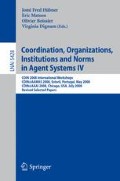Abstract
Our main interest research is focused on reaching a decentralized form of social order through the usage of social norms in virtual communities. In this paper, we analyze the effects of different sets of social norms within a society. The simulation scenario used for the experiments is a metaphor of a resource-gatherer prehistoric society. Finally, we obtain a qualitative ranking of all the possible sets of social norms in our scenario performing agent-based simulation.
Access this chapter
Tax calculation will be finalised at checkout
Purchases are for personal use only
Preview
Unable to display preview. Download preview PDF.
References
Bicchieri, C.: The Grammar of Society: The nature and Dynamics of Social Norms. Cambridge University Press, Cambridge (2006)
Saam, N.J., Harrer, A.: Simulating norms, social inequality, and functional change in artificial societies. Journal of Artificial Societies and Social Simulation 2(1) (1999)
Shoham, Y., Tenneholtz, M.: On the synthesis of useful social laws for artificial agent societies (preliminary report). In: Proceedings of the AAAI Conference, pp. 276–281 (1992)
Walker, A., Wooldridge, M.: Understanding the emergence of conventions in multi-agent systems. In: Lesser, V. (ed.) Proceedings of the First International Conference on Multi–Agent Systems, pp. 384–389. MIT Press, San Francisco (1995)
Grizard, A., Vercouter, L., Stratulat, T., Muller, G.: A peer-to-peer normative system to achieve social order. In: AAMAS 2006 Workshop on Coordination, Organization, Institutions and Norms in agent systems (COIN) (2006)
Axelrod, R.: An evolutionary approach to norms. The American Political Science Review 80(4), 1095–1111 (1986)
Sen, S., Airiau, S.: Emergence of norms through social learning. In: Proceedings of IJCAI 2007, pp. 1507–1512 (2007)
Gilbert, N.: Varieties of emergence. Edited transcript of the introductory talk given at the Workshop on Agent 2002 Social Agents: Ecology, Exchange, and Evolution Conference (October 2002)
Kittock, J.E.: The impact of locality and authority on emergent conventions: initial observations. In: AAAI 1994 Proceedings of the Twelfth National Conference on Artificial Intelligence. American Association for Artificial Intelligence, vol. 1, pp. 420–425 (1994)
Savarimuthu, B.T.R., Cranefield, S., Purvis, M., Purvis, M.: Role model based mechanism for norm emergence in artificial agent societies. In: Proceedings of the AAMAS 2007 Workshop on Coordination, Organization, Institutions and Norms in Agent Systems (COIN), Honolulu, Hawaii, USA (2007)
Excelente-Toledo, C.B., Jennings, N.R.: The dynamic selection of coordination mechanisms. Journal of Autonomous Agents and Multi-Agent Systems (2004)
Cecconi, F., Parisi, D.: Individual versus social survival strategies. Journal of Artificial Societies and Social Simulation 1(2) (1998)
Sen, S., Biswas, A., Debnath, S.: Believing others: Pros. and cons. (2000)
Villatoro, D., Sabater-Mir, J.: Norm selection through simulation in a resource-gathering society. In: Proceedings of 21st European Simulation and Modelling Conference (ESM) (2007)
Paolucci, M., Conte, R., Tosto, G.D.: A model of social organization and the evolution of food sharing in vampire bats. Adaptive Behavior 41(3), 223–239 (2006)
de Waal, F.: Good natured. Harvard University Press (1996)
Gusinde, M.: Los Indios de la Tierra del Fuego. CAEA (1982)
Rice, J.A.: Mathematical Statistics and Data Analysis. Duxbury Press (April 2001)
Author information
Authors and Affiliations
Editor information
Editors and Affiliations
Rights and permissions
Copyright information
© 2009 Springer-Verlag Berlin Heidelberg
About this paper
Cite this paper
Villatoro, D., Sabater-Mir, J. (2009). Categorizing Social Norms in a Simulated Resource Gathering Society. In: Hübner, J.F., Matson, E., Boissier, O., Dignum, V. (eds) Coordination, Organizations, Institutions and Norms in Agent Systems IV . COIN 2008. Lecture Notes in Computer Science(), vol 5428. Springer, Berlin, Heidelberg. https://doi.org/10.1007/978-3-642-00443-8_16
Download citation
DOI: https://doi.org/10.1007/978-3-642-00443-8_16
Publisher Name: Springer, Berlin, Heidelberg
Print ISBN: 978-3-642-00442-1
Online ISBN: 978-3-642-00443-8
eBook Packages: Computer ScienceComputer Science (R0)

